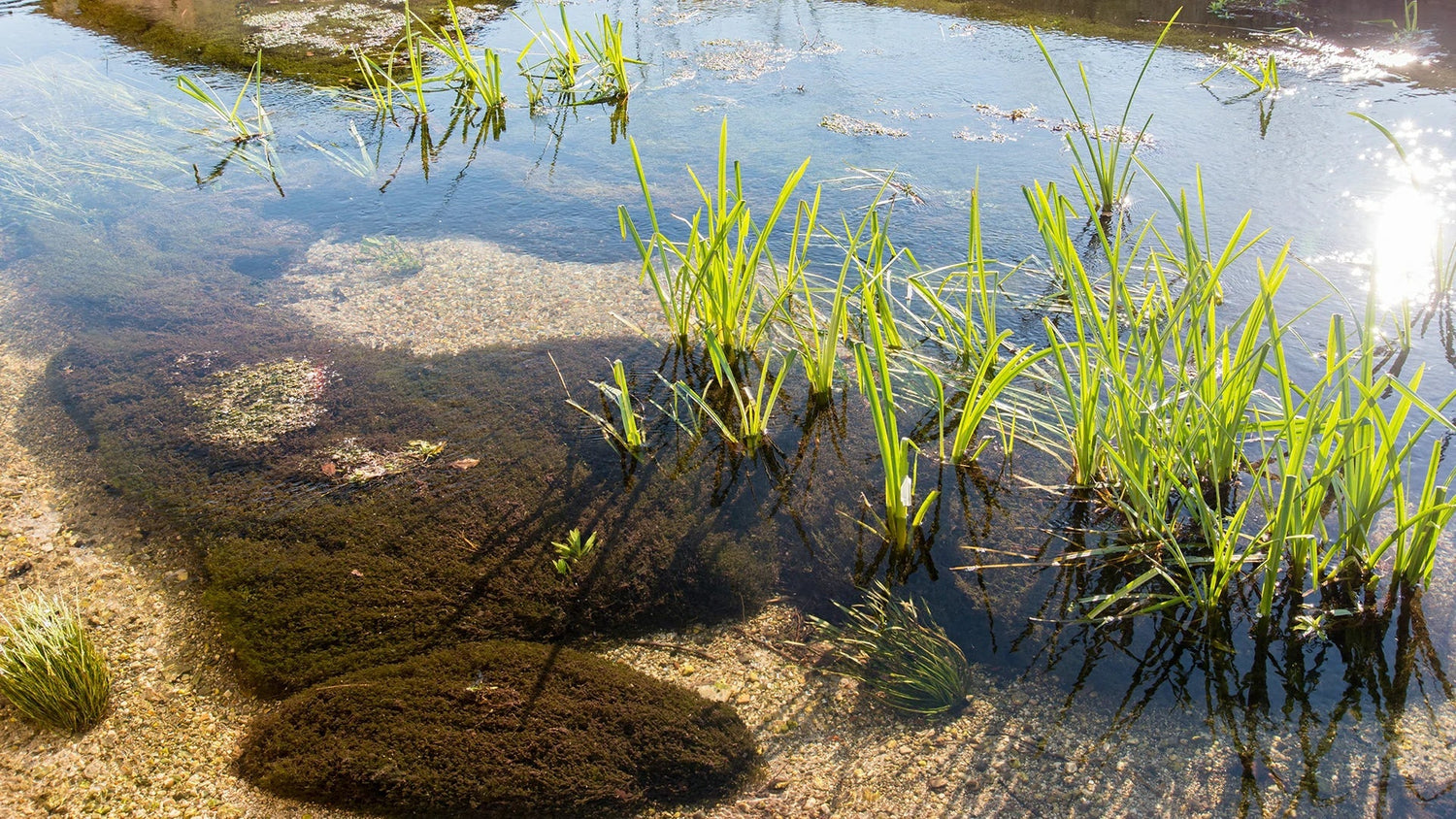Nothing can ruin the peace of a pond faster than cloudy, algae-infested water. Filters and pumps are required, but often the ideal solution lies in Mother Nature herself: plants for pond water. Choosing the right mix of clear pond water plants can restore a filthy pond to a clear, healthy home. Plants not only cleanse the water but stabilize nutrients, shade the water, and provide cover for wildlife.
For green pond owners, plants aren't only for decoration—plants are 24/7 natural filters. Let's explore why plants matter, which types perform best, and how to use them for long-term clarity.
Why Plants Clean Water
Plants are necessary for keeping the water quality high as they fight algae for nutrients and light. Algae blooms consume leftover phosphates and nitrogen, which typically enter from fish waste, dead leaves, or runoff. Pond cleaning plants absorb these nutrients, thus removing the algae's food source.
Floating leaves also provide shade, blocking sunlight penetration that promotes algae growth. Underwater plants produce oxygen during photosynthesis, which improves the environment for fish and helpful bacteria. Collectively, they create a natural system of filtration.
It all works with Poposoap's vision of ecological harmony. Their filter boxes and solar pumps help create water flow, but the plants help regulate the balance and maintain the pond clear and wildlife-tolerant.
Top Floating Plants for Clarity
Free-floating plants are the first line of defense in maintaining water quality. By shading parts of the surface, they restrict sunlight and consume nutrients directly from the water column.
Water Lilies: Established pond classics, lilies cast broad shade and control water temperature extremes. Their roots absorb nutrients, while pads offer resting sites for insects and frogs.

Water Lettuce: This fast-growing floater has soft, velvety leaves and hanging roots that act as nutrient sponges. It thrives in the summer and helps prevent green water.

Frogbit: Frogbit is smaller than water lettuce and grows quickly, so it's easy to manage. Frogbit is ideal for smaller ponds where dense shading isn't desired.

Duckweed: Duckweed is a high-potential water clarifier that tends to be underrated. Though it possesses aggressive spreading potential, it's ideal for nutrient uptake if properly controlled.

For pond solar fountains, Poposoap recommends locating floaters far from pump intake. This prevents clogging without reducing the shading and cleaning contribution of aquatic plants to water clarity.
Submerged Oxygenators
While floaters address nutrients and light, submerged plants work below the surface to oxygenate and stabilize water quality.
Hornwort: A tough plant that can survive without soil, hornwort absorbs nutrients from the water. Excellent at suppressing algae, it is also a home for fish fry and insects.

Elodea (Anacharis): A rapidly growing clear pond plant renowned for clearing pond water, elodea produces oxygen during the day. It's especially effective in fish ponds.

Cabomba: Elegant with its feathery leaves, cabomba provides good cover for aquatic creatures while reducing nutrient levels.

Vallisneria (Eelgrass): A grassy plant, it forms dense mats that anchor sediment and prevent cloudiness from suspended debris.

Combining oxygenators with Poposoap circulation pumps results in stable oxygen levels that prevent the stagnant conditions where algae thrives.
Planting and Maintenance
Planting is every bit as important as choosing the right species. A balanced pond should contain a mix of floaters, marginals, and submerged oxygenators.
- Placement: Floaters should cover about 50–70% of the surface during summer for maximum shading without excluding all light. Submerged plants should be anchored in shallow baskets or directly into gravel at the bottom of the pond.
- Maintenance: Thin out rapidly growing ones such as water lettuce or elodea regularly. Removal of excess growth not only prevents overgrowth but also removes absorbed nutrients from the system.
- Seasonal Care: In colder climates, delicate floaters like water lettuce and frogbit won't survive winter. Remove them before frost and replace with new plants in spring. Stronger submerged varieties like hornwort will overwinter in the lower areas.
- Cleaning Around Pumps: Poposoap's handbook stresses keeping pump intakes clear of blockages. Use plant baskets or netting screens to prevent roots and leaves from entering the system.
These practices convert plants into reliable partners in garden pond maintenance, reducing the need for chemicals.
Natural Pond Balance with Flora
Plants don't merely filter water; they create a complete environment. A well-balanced natural pond with aquatic plants supports frogs, dragonflies, butterflies, and birds. Floating leaves provide resting places for amphibians safe from predators, whereas underwater oxygenators release oxygen for fish and bacteria. Marginal aquatic plants along the edges welcome pollinators and shelter small animals.
This variety of life naturally keeps pests under control. Dragonflies and frogs eat mosquitoes, and birds use ponds as watering holes without worrying about predators. By combining pond purification plants with Poposoap's green pumps and filters, you have a system wherein each part—plants, wildlife, and equipment—works in harmony.

Poposoap's brand story is centered around creating water features that are functional and ecological. Choosing the right plants is the simplest way to maintain long-term clarity without chemicals or regular intervention.
Final Thoughts
The prettiest ponds aren't those that have the largest filters—those are the ones where plants carry the load. By choosing a well-balanced assortment of floaters and oxygenators, and by maintaining them seasonally, you can have sparkling water all year long.
When upgrading your pond, don't just think about hardware. Include clear pond water plants such as water lilies and hornwort, and pair them up with circulation equipment like Poposoap solar pumps. Combined, they provide a pond that remains clean, balanced, and teeming with wildlife.
Poposoap's eco-conscious approach makes it easy for pond owners to combine natural solutions with sustainable technology. By embracing aquatic plants for clarity, you’ll transform your water feature into more than just decoration—it becomes a thriving ecosystem where clarity, health, and beauty coexist.





Leave a comment
All comments are moderated before being published.
This site is protected by hCaptcha and the hCaptcha Privacy Policy and Terms of Service apply.